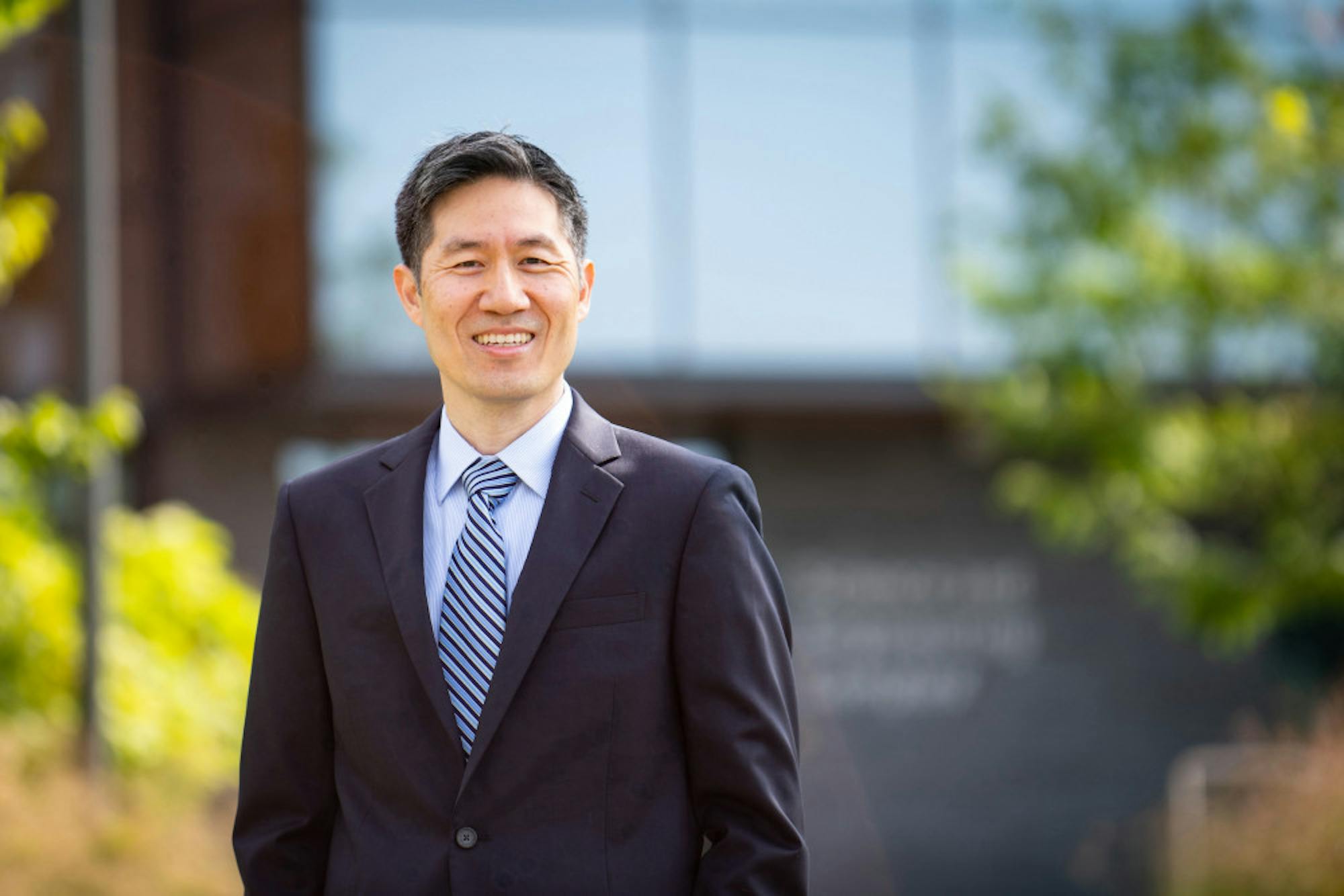Professor Kyongbum Lee was named Karol Family professor and dean ad interim of the School of Engineering on Aug. 3. He replaced Jianmin Qu, who left Tufts to become provost and vice president for academic affairs at Stevens Institute of Technology at the end of the same month.
Lee previously served as chair of the Department of Chemical and Biological Engineering at Tufts for 11 years. He joined Tufts as an assistant professor in 2002 before being promoted to associate professor in 2008 and a full professor in 2014. He earned his B.S. at Stanford and his Ph.D. at MIT.
Lee’s research focuses on metabolic engineering, systems biology and cellular metabolism. In 2015, Lee was named a fellow of the American Institute for Medical and Biological Engineering for his contributions to biomedical engineering through experimental studies in cellular metabolism. He has received the Jay Bailey Young Investigator Best Paper Award in Metabolic Engineering 2006 and the Graduate Teaching and Mentoring Award in 2010.
One of Lee’s priorities within the School of Engineering is to foster diversity and inclusion within the student body, faculty and administration, an effort in which the school has invested heavily over the past five years under Qu.
"[The School of Engineering] created a Division of Student Diversity and Inclusion jointly with the School of Arts and Sciences and raised more than one million dollars for the Center for STEM Diversity,'' Lee wrote in an email to the Daily.
Other initiatives include a $1 million grant from the National Science Foundation to increase underrepresented and LGBTQ students’ accessibility to programs and an added requirement for tenure-line faculty candidates to include a diversity and inclusion statement in their applications.
Moreover, Lee has also observed an increase in the percentage of women in the engineering undergraduate student population.
“The incoming Class of 2025 engineering undergraduate class is near gender parity, with more than 49% women,” Lee said.
Despite this progress, Lee emphasized the necessity for continuing to improve diversity and inclusion in the School of Engineering.
"We recognize that SOE needs to continue improving its student body diversity with respect to underrepresented students of color," Lee said. "We also recognize that systemic barriers still exist that can hinder these students’ success in the SOE. The vital work of improving diversity and lowering barriers will continue under my leadership."
Nadine Aubry, provost and senior vice president, voiced a similar concern about the lack of diversity in engineering spaces.
“As someone with an engineering background myself, I am well versed in the lack of diversity in the STEM workforce and understand how it negatively impacts our society and ability to grow technologically,” Aubry wrote in an email. "The Engineering school has dedicated itself to building a more just, equitable, inclusive and diverse culture that impacts not only the school but also extends outside its boundaries."
Chris Swan, dean of undergraduate education in the School of Engineering and an associate professor in the Department of Civil and Environmental Engineering, explained the various diversity, equity, inclusion and justice (DEIJ) initiatives that were recently implemented or are in the process of implementation.
“Specific items that are in place include the development of a 15-person, standing committee on DEIJ in the School that includes membership from SOE faculty, student, staff, and alumni,” Swan wrote in an email to the Daily. “The School has also developed different means of engaging with its community on DEIJ topics, namely the DEI Colloquium Series (2 presentations planned per year) and the DEIJ Forums (4 forums planned per year).”
According to Swan, the School of Engineering will be implementing a new effort called the DEIJ Conversations, consisting of 6–10 events per year, which will encourage conversations about current topics. Lee will also be expanding course offerings within the School of Engineering to include diversity and inclusion as one of the course’s core elements.
More broadly, Lee hopes to continue Qu’s strategic vision for the School of Engineering with "An Engine for Good: The School of Engineering Strategic Plan 2019–2029.”
The plan divides objectives into three categories based on how soon they can be completed. The first category can be completed within a year, the second can be completed within four years and the third will take more than four years to complete.
"[The School of Engineering] is committed to providing a diverse and inclusive learning and working environment, building community, innovating undergraduate education and transforming graduate education, connecting people and ideas for innovation, enhancing financial resources to support our mission, and empowering scholarship, discovery, and invention,” Lee said.






